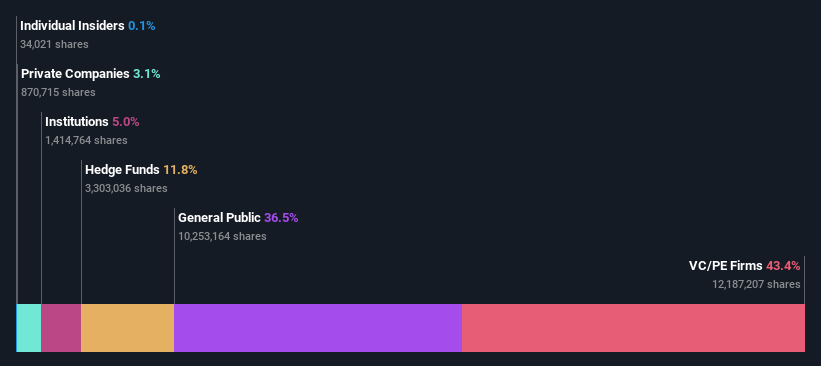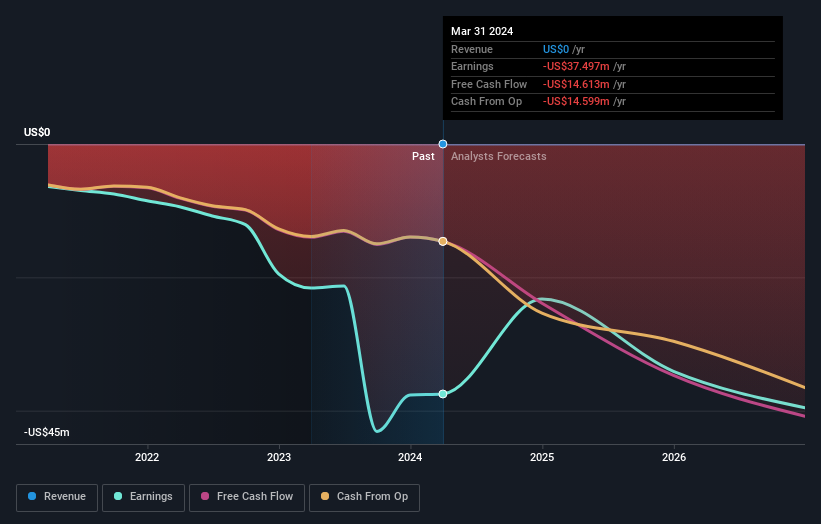Stock Analysis
- United States
- /
- Biotech
- /
- NasdaqGM:SKYE
Private equity firms are Skye Bioscience, Inc.'s (NASDAQ:SKYE) biggest owners and were hit after market cap dropped US$48m

Key Insights
- The considerable ownership by private equity firms in Skye Bioscience indicates that they collectively have a greater say in management and business strategy
- A total of 4 investors have a majority stake in the company with 55% ownership
- Ownership research, combined with past performance data can help provide a good understanding of opportunities in a stock
To get a sense of who is truly in control of Skye Bioscience, Inc. (NASDAQ:SKYE), it is important to understand the ownership structure of the business. With 43% stake, private equity firms possess the maximum shares in the company. That is, the group stands to benefit the most if the stock rises (or lose the most if there is a downturn).
And last week, private equity firms endured the biggest losses as the stock fell by 13%.
Let's delve deeper into each type of owner of Skye Bioscience, beginning with the chart below.
Check out our latest analysis for Skye Bioscience

What Does The Institutional Ownership Tell Us About Skye Bioscience?
Institutions typically measure themselves against a benchmark when reporting to their own investors, so they often become more enthusiastic about a stock once it's included in a major index. We would expect most companies to have some institutions on the register, especially if they are growing.
We can see that Skye Bioscience does have institutional investors; and they hold a good portion of the company's stock. This can indicate that the company has a certain degree of credibility in the investment community. However, it is best to be wary of relying on the supposed validation that comes with institutional investors. They too, get it wrong sometimes. It is not uncommon to see a big share price drop if two large institutional investors try to sell out of a stock at the same time. So it is worth checking the past earnings trajectory of Skye Bioscience, (below). Of course, keep in mind that there are other factors to consider, too.

It looks like hedge funds own 12% of Skye Bioscience shares. That worth noting, since hedge funds are often quite active investors, who may try to influence management. Many want to see value creation (and a higher share price) in the short term or medium term. Looking at our data, we can see that the largest shareholder is 5AM Venture Management, LLC with 36% of shares outstanding. In comparison, the second and third largest shareholders hold about 7.2% and 6.4% of the stock.
Our research also brought to light the fact that roughly 55% of the company is controlled by the top 4 shareholders suggesting that these owners wield significant influence on the business.
While studying institutional ownership for a company can add value to your research, it is also a good practice to research analyst recommendations to get a deeper understand of a stock's expected performance. While there is some analyst coverage, the company is probably not widely covered. So it could gain more attention, down the track.
Insider Ownership Of Skye Bioscience
The definition of an insider can differ slightly between different countries, but members of the board of directors always count. The company management answer to the board and the latter should represent the interests of shareholders. Notably, sometimes top-level managers are on the board themselves.
Insider ownership is positive when it signals leadership are thinking like the true owners of the company. However, high insider ownership can also give immense power to a small group within the company. This can be negative in some circumstances.
Our data suggests that insiders own under 1% of Skye Bioscience, Inc. in their own names. We do note, however, it is possible insiders have an indirect interest through a private company or other corporate structure. It appears that the board holds about US$385k worth of stock. This compares to a market capitalization of US$318m. We generally like to see a board more invested. However it might be worth checking if those insiders have been buying.
General Public Ownership
The general public-- including retail investors -- own 37% stake in the company, and hence can't easily be ignored. While this size of ownership may not be enough to sway a policy decision in their favour, they can still make a collective impact on company policies.
Private Equity Ownership
With an ownership of 43%, private equity firms are in a position to play a role in shaping corporate strategy with a focus on value creation. Some might like this, because private equity are sometimes activists who hold management accountable. But other times, private equity is selling out, having taking the company public.
Private Company Ownership
It seems that Private Companies own 3.1%, of the Skye Bioscience stock. Private companies may be related parties. Sometimes insiders have an interest in a public company through a holding in a private company, rather than in their own capacity as an individual. While it's hard to draw any broad stroke conclusions, it is worth noting as an area for further research.
Next Steps:
While it is well worth considering the different groups that own a company, there are other factors that are even more important. Case in point: We've spotted 5 warning signs for Skye Bioscience you should be aware of, and 4 of them are significant.
Ultimately the future is most important. You can access this free report on analyst forecasts for the company.
NB: Figures in this article are calculated using data from the last twelve months, which refer to the 12-month period ending on the last date of the month the financial statement is dated. This may not be consistent with full year annual report figures.
Valuation is complex, but we're helping make it simple.
Find out whether Skye Bioscience is potentially over or undervalued by checking out our comprehensive analysis, which includes fair value estimates, risks and warnings, dividends, insider transactions and financial health.
View the Free AnalysisHave feedback on this article? Concerned about the content? Get in touch with us directly. Alternatively, email editorial-team (at) simplywallst.com.
This article by Simply Wall St is general in nature. We provide commentary based on historical data and analyst forecasts only using an unbiased methodology and our articles are not intended to be financial advice. It does not constitute a recommendation to buy or sell any stock, and does not take account of your objectives, or your financial situation. We aim to bring you long-term focused analysis driven by fundamental data. Note that our analysis may not factor in the latest price-sensitive company announcements or qualitative material. Simply Wall St has no position in any stocks mentioned.
About NasdaqGM:SKYE
Skye Bioscience
A clinical stage biopharmaceutical company, discovers, develops, and commercializes therapeutic drugs that modulate the endocannabinoid system.
Flawless balance sheet with weak fundamentals.


